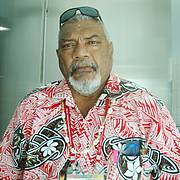A conservation leader: Fijian chief leads by example
12 September 2012 | Article
Strong leadership is key to successful conservation at the community level. For Ratu Aisea Katonivere, chief of Macuata Province in Fiji, conservation is successful if it is driven and owned by communities.
Inspiring hearts at the IUCN Word Conservation Congress, Ratu Aisea shares why nature is worth saving and how marine protected areas are helping to replenish food and livelihood sources for the people of his province.
Why is nature worth saving?
Macuata is one of Fiji's biggest provinces comprised of more than 100 villages and sprawled along a vast coastline along the second biggest island, Vanua Levu. The Great Sea Reef, the third longest barrier reef in the world, is a fishing ground for the people of Macuata. In their efforts to protect the Great Sea Reef, to date, district leaders of the province have endorsed 15 marine and mangrove protected areas with some areas protected for several years already.
Why is it important that community leaders take a lead role in conservation?
What is the key reason that MPAs are successful for conservation in Macuata?
What are some of the lessons that you have learnt from this congress and will take back home?
In recognition of his work in protecting Fiji's marine biodiversity, Ratu Aisea was awarded the 2006 Global Ocean Conservation Award, which is given annually on World Ocean Day (June 8) to an individual who makes globally significant contributions in areas such as ocean use planning, marine conservation communications, and coastal zone management.



